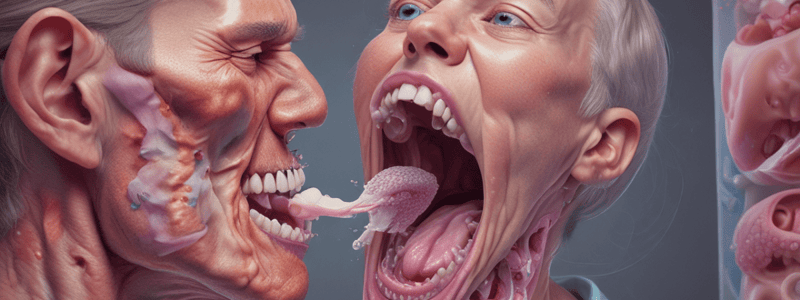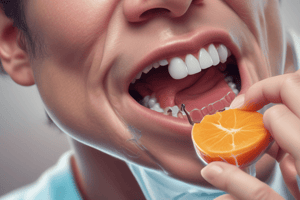Podcast
Questions and Answers
What are the consequences of dysphagia?
What are the consequences of dysphagia?
Malnutrition and dehydration, aspiration pneumonia, chronic lung disease, long hospitalization, increased cost of care
What is the incidence range of dysphagia in acute stroke?
What is the incidence range of dysphagia in acute stroke?
55% to 64%
What are the common causes of dysphagia?
What are the common causes of dysphagia?
Neurological disorders like stroke, traumatic brain injury (TBI), spinal cord injury, multiple sclerosis, Parkinson’s disease, myasthenia gravis. Also, treatments for head and neck cancer and rheumatoid arthritis.
What is the role of SLP in dysphagia?
What is the role of SLP in dysphagia?
What are some specific roles of SLP in dysphagia?
What are some specific roles of SLP in dysphagia?
What percentage of inpatients aged 55 years and above in the US experience dysphagia?
What percentage of inpatients aged 55 years and above in the US experience dysphagia?
What are the 4 stages involved in the normal swallowing process?
What are the 4 stages involved in the normal swallowing process?
What is the role of a Speech-Language Pathologist (SLP) in dysphagia?
What is the role of a Speech-Language Pathologist (SLP) in dysphagia?
What should an SLP be aware of regarding swallow function?
What should an SLP be aware of regarding swallow function?
What is crucial for an SLP when assessing swallow function?
What is crucial for an SLP when assessing swallow function?
What are the two phases of the normal swallowing process that are voluntary?
What are the two phases of the normal swallowing process that are voluntary?
Which phase of the normal swallowing process is involuntary?
Which phase of the normal swallowing process is involuntary?
What are the risks associated with flexible endoscopic evaluation of swallowing (FEES)?
What are the risks associated with flexible endoscopic evaluation of swallowing (FEES)?
What are some disorders/diseases that are known to cause dysphagia?
What are some disorders/diseases that are known to cause dysphagia?
According to Perlman & Schultz (1997), what are some medications known to affect swallowing?
According to Perlman & Schultz (1997), what are some medications known to affect swallowing?
What can a clinician visualize during the swallow using flexible endoscopic evaluation?
What can a clinician visualize during the swallow using flexible endoscopic evaluation?
What are some things to consider in non-instrumental assessment of dysphagia?
What are some things to consider in non-instrumental assessment of dysphagia?
How does 'white-out' impact the observation of the swallow during endoscopy?
How does 'white-out' impact the observation of the swallow during endoscopy?
How can you check the vagus nerve in dysphagia assessment?
How can you check the vagus nerve in dysphagia assessment?
What recommendations can a Speech-Language Pathologist (SLP) give based on assessment findings in dysphagia management?
What recommendations can a Speech-Language Pathologist (SLP) give based on assessment findings in dysphagia management?
What are some things to assess after bolus delivery in the mouth during dysphagia assessment?
What are some things to assess after bolus delivery in the mouth during dysphagia assessment?
Why is non-instrumental dysphagia assessment considered insufficient?
Why is non-instrumental dysphagia assessment considered insufficient?
What are some common procedures in instrumental swallowing assessment?
What are some common procedures in instrumental swallowing assessment?
What physiological changes can be observed during dysphagia assessment?
What physiological changes can be observed during dysphagia assessment?
What is the purpose of the Shaker swallowing exercise?
What is the purpose of the Shaker swallowing exercise?
How is the Shaker swallowing exercise performed?
How is the Shaker swallowing exercise performed?
What is the focus of using special cups in dysphagia management?
What is the focus of using special cups in dysphagia management?
What is emphasized in the conclusion regarding dysphagia management?
What is emphasized in the conclusion regarding dysphagia management?
What key skill is required for practicing assessment and management of dysphagia?
What key skill is required for practicing assessment and management of dysphagia?




